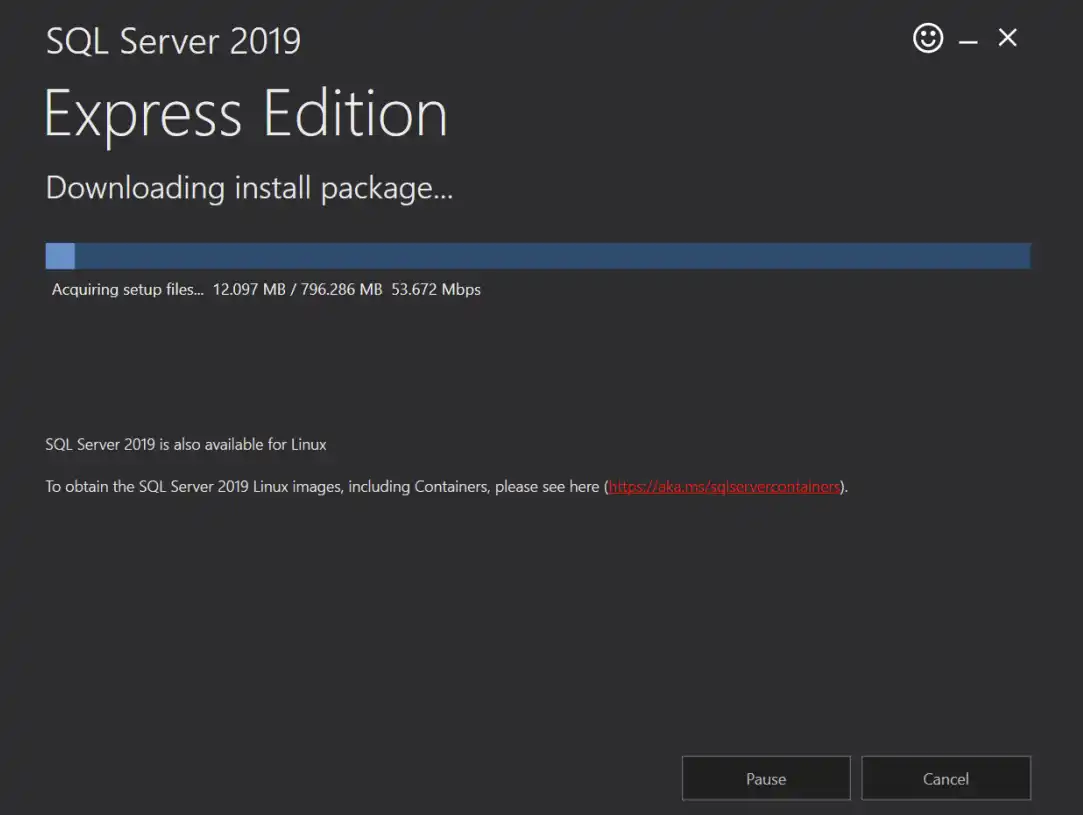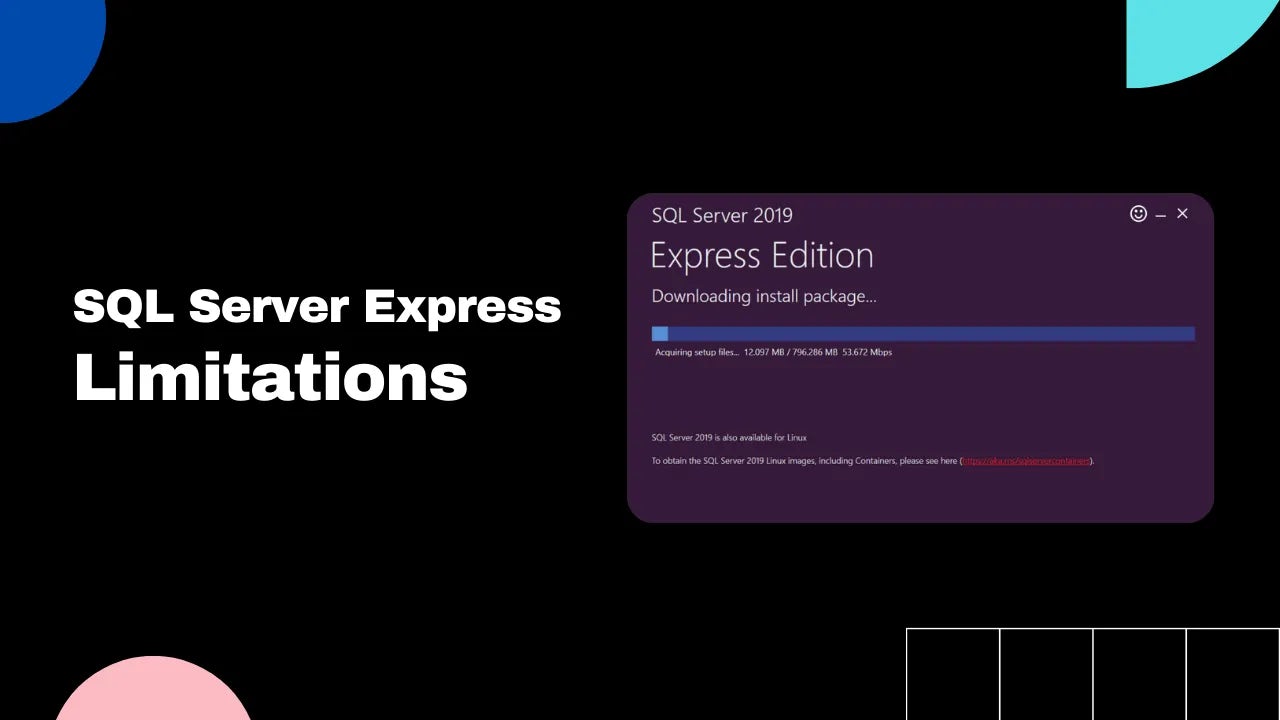7 SQL Server Express Limitations [2023]
Key Points
SQL Server Express is a free and easy-to-install database that has the same core engine as higher-end versions of SQL Server.
However, it has limitations:
- Maximum database size of 10 GB
- Maximum 1410 MB of memory
- Maximum compute of 1 socket or 4 cores
- No support for Always On
- No SQL Job Agent
- No SQL Analysis Services
- No SQL Integration Services
What is SQL Server Express?
SQL Server Express is a free database that is ideal for small projects.

Despite being a free version, the core engine of SQL Server Express remains the same as other editions of SQL Server. Users still have access to powerful tools and features available in SQL Server.
Upgrading from one version to another should also not cause any significant issues since Microsoft has maintained upward compatibility between different versions of SQL for many years.
Now, let's talk about limitations...
What are the limitations of SQL Server Express?
Microsoft offers SQL Server Express for free because of the arbitrary limits imposed on the features of the database server. SQL Server Express is a great marketing tool. It lets you get started, but once your database grows, Microsoft wants you to switch to the paid SQL Server. Luckily, the transition is very smooth.
Before you decide to use it, here's a full list of SQL Server Express limitations:
1. Maximum database size of 10 GB
SQL Server Express edition has a limit of 10 GB per database file.
It is possible to work around this limit by having multiple database files:
- Horizontal partitioning can be used to split up a dataset that exceeds 10GB by dividing it into multiple databases, such as one for each region.
- Vertical partitioning is an alternative way to separate data by storing different columns and tables in different databases while still allowing cross-database queries.
What is a database file?
Each file represents one database in the database tree, so splitting the app into multiple databases can help work around the 10 GB limit. However, this could result in losing some of the advantages of a relational database.
2. Maximum 1410 MB of memory
SQL Express has a 1410 MB limit on its buffer pool size.
The SQL Server buffer pool is a memory space that stores frequently accessed data pages to improve database performance. Its purpose is to minimize file I/O and speed up data retrieval.
Why is database memory important?
Database memory is important because if there isn't enough memory available on the server, SQL Server will have to read from disk more often which can lead to slow query response times and overall system slowdowns. Additionally, insufficient memory may cause other issues like excessive paging of virtual memory or even crash if too much load is placed on the system.
Having an appropriate amount of memory provisioned for SQL Server is critical for maintaining optimal performance and stability.
3. Maximum compute of 1 socket or 4 cores
The maximum compute capacity for SQL Express is limited to 1 socket or 4 cores.
This means that a single instance of SQL Express can utilize up to either one physical processor socket or four processor cores, whichever limit is reached first.
It's important to note that this limit only applies to a single instance of SQL Express and does not restrict the deployment of multiple instances on the same physical server, which can help maximize the compute capacity of a server with more sockets and/or cores than the limits allow.
4. No support for Always On
SQL Server Express does not support Always On availability groups.
Always On availability groups is a SQL Server feature that provides high-availability and disaster-recovery solutions. It supports failover environments for a set of user databases known as availability databases, with up to nine replicas and two commit modes. It also offers several forms of failover, active-secondary capabilities, an availability group listener, flexible failover policies, automatic page repair for protection against page corruption, encryption and compression for secure transport.
5. No support for SQL Job Agent
A big limitation of SQL Express is the lack of SQL Agent support.
SQL Server Agent is a useful tool because it allows database developers to schedule and automate repetitive tasks. For example, backing up databases, deleting log files, and running ETL jobs.
6. No support for SQL Analysis Services
SQL Server Express doesn't support SQL Server Analysis Services.
SQL Server Analysis Services is an analytical data engine. It's used in decision support and business analytics because it provides semantic data models for client applications like Power BI, Excel, and Reporting Services.
7. No SQL Integration Services
SQL Server Express doesn't support SQL Server Integration Services.
SQL Server Integration Services (SSIS) is a platform used for building data integration and transformation solutions. It allows users to extract, transform, and load data from various sources into one or more destinations. SSIS includes a range of built-in tasks and transformations, as well as graphical tools for creating packages without needing to write code.
Josip Miskovic is a software developer at Americaneagle.com. Josip has 10+ years in experience in developing web applications, mobile apps, and games.
Read more posts →- What is SQL Server Express?
- What are the limitations of SQL Server Express?
- 1. Maximum database size of 10 GB
- 2. Maximum 1410 MB of memory
- 3. Maximum compute of 1 socket or 4 cores
- 4. No support for Always On
- 5. No support for SQL Job Agent
- 6. No support for SQL Analysis Services
- 7. No SQL Integration Services

I've used these principles to increase my earnings by 63% in two years. So can you.
Dive into my 7 actionable steps to elevate your career.
